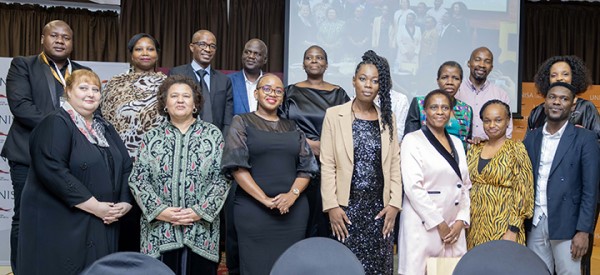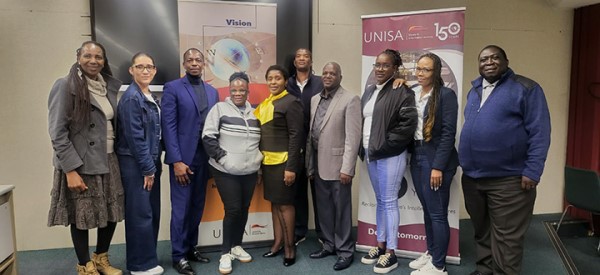News & Media
Unisa LIS staff sweep awards after months of research training and mentorship
On 3 April 2025, staff members from Unisa’s Library and Information Services (LIS) were honoured at the 4th Biennial UNILISA Conference awards ceremony – an inspiring milestone that reflects the culmination of a sustained research development initiative. The atmosphere was electric – not just because of the honours being presented, but because those who were recognised had invested months in a focused research development programme that is steadily transforming Unisa LIS into a hub of scholarly innovation.

Front, from left: Prof Lorette Jacobs (Acting Head: Office of Tuition and Learner Support), Elinor Sisulu (Executive Director of PUKU Foundation), Salamina Setumu (Unisa Library Personal Assistant), Itumeleng Mpete (Unisa Library Marketing Coordinator), Phindile Bhekwa (Air-traffic Navigation Service), Prof Nampombe Saurombe (Acting Chair of Department of Information Science) and Wisdom Ndashe (Air-traffic Navigation Service)
Back, from left: Dr Mashilo Modiba (Department of Information Science Lecturer), Khanyisile Ngcobo (National Archives Deputy Director), Prof Mpho Ngoepe (Unisa Library Executive Director), Puleng Kekana (Chief Director of National Archives), Dr Mmatla Mahlatji (Department of Information Science Lecturer), Prof Azwihangwisi Mavhandu-Mudzusi (Director of School of Social Science), Prof Siyasanga Tyali (Director of School of Arts) and Dr Refiloe Mabaso (Chairperson of the National Library of South Africa)
These awards were not earned overnight. They are the visible outcomes of a structured and ongoing mentorship programme that began late in 2024, as previously covered in a feature article. The research series was officially launched by Prof Mpho Ngoepe of Unisa, whose session on Scholarly Publishing: Papers and Book Proceedings laid the groundwork for understanding the academic publishing landscape. This was followed by Prof Loretta Jacobs, who provided a focused session on Abstract Writing, equipping participants with the tools to summarise their research effectively and with academic precision. The programme has since expanded to include critical follow-up sessions and mentoring that have empowered LIS staff to become confident contributors to academic discourse.
Celebrating excellence
Among the evening’s standout moments was Itumeleng Mpete receiving the Most Outstanding Research Paper award for her innovative exploration of branding and innovation in the context of the Fourth and Fifth Industrial Revolutions.
"This journey has stretched me intellectually and professionally," Mpete reflected. "Winning this award has not only affirmed my research direction, but also deepened my passion for contributing to the LIS field in transformative ways."
Minah Setumu was recognised for her debut presentation, making a strong impression as a first-time academic contributor. Dr Mduduzi Ntetha, who chaired a session on institutional research niche areas, received the Best Session Chair award. In total, five presentations were delivered by LIS staff, with several featured during dynamic lightning talk sessions – highlighting the team’s agility, confidence and scholarly depth.
Continuing the Learning Journey
Following the launch workshop, Prof Samuel Mojapelo led the session on literature reviews on 4 March. The research series progressed with a session by Prof Risenga Maluleka on 14 March, which demystified theoretical and conceptual frameworks. The latest session in the series, held on 9 April and facilitated by Dr Daniel Mosako, focused on research methodologies, equipping staff with tools to navigate qualitative and quantitative approaches, data collection techniques, and key paradigms such as positivism and interpretivism.

LIS Research workshop series Doctors and Candidates Doctors
Dr Mosako not only led the session, but also mentored staff throughout their research journeys. His support included co-authoring papers and refining presentation techniques – efforts that directly contributed to the high calibre of work presented at the conference.
"The participation of LIS staff was more than symbolic," said Dr Mosako. "It proved that we are nurturing a strong research culture that’s sustainable and empowering."
The five presentations delivered at the conference reflected the department’s growing expertise in emerging LIS issues:
Lightning talks presentations
- Open access in South African higher education – Mokgadi Senyolo
- The impact of technological advancements on LIS – Dr Lesiba Ledwaba
Main conference presentations
- Branding and innovation in the Fourth and Fifth Industrial Revolutions – Itumeleng Mpete
- Copyright law and library services – Dr Mosako and Salaminah Setumu
- Futuristic content management aligned with Society 5.0 – Sizakele Nkosi, Fatima Darries and Dr Mosako
These topics demonstrate the LIS team’s deepening engagement with the strategic, technological and policy-oriented dimensions of the profession.
More than just awards
The UNILISA Conference highlighted a pivotal shift, that LIS is not only a support service, but a contributor to Unisa’s knowledge production ecosystem. The department’s investment in mentorship and training is creating a sustainable culture of scholarship.
"Watching our colleagues grow into confident researchers and presenters has been truly inspiring," said Dr Mosako. "What we’re building here is not just academic skill –it’s a culture of scholarship."
As the applause fades, one thing is clear – this is only the beginning. The LIS department is now on a route of continued academic growth, collaboration, and professional recognition.
* By Itumeleng Mpete and Mpho Masingi, Marketing and Communication Specialists, Library and Information Services
Publish date: 2025/05/02

 Unisa co-hosts G20 community outreach in the Eastern Cape
Unisa co-hosts G20 community outreach in the Eastern Cape
 Unisans gain membership of prestigious science academies
Unisans gain membership of prestigious science academies
 Advocating for disability transformation through servant leadership
Advocating for disability transformation through servant leadership
 Unisa Press continues to illuminate the publishing space
Unisa Press continues to illuminate the publishing space